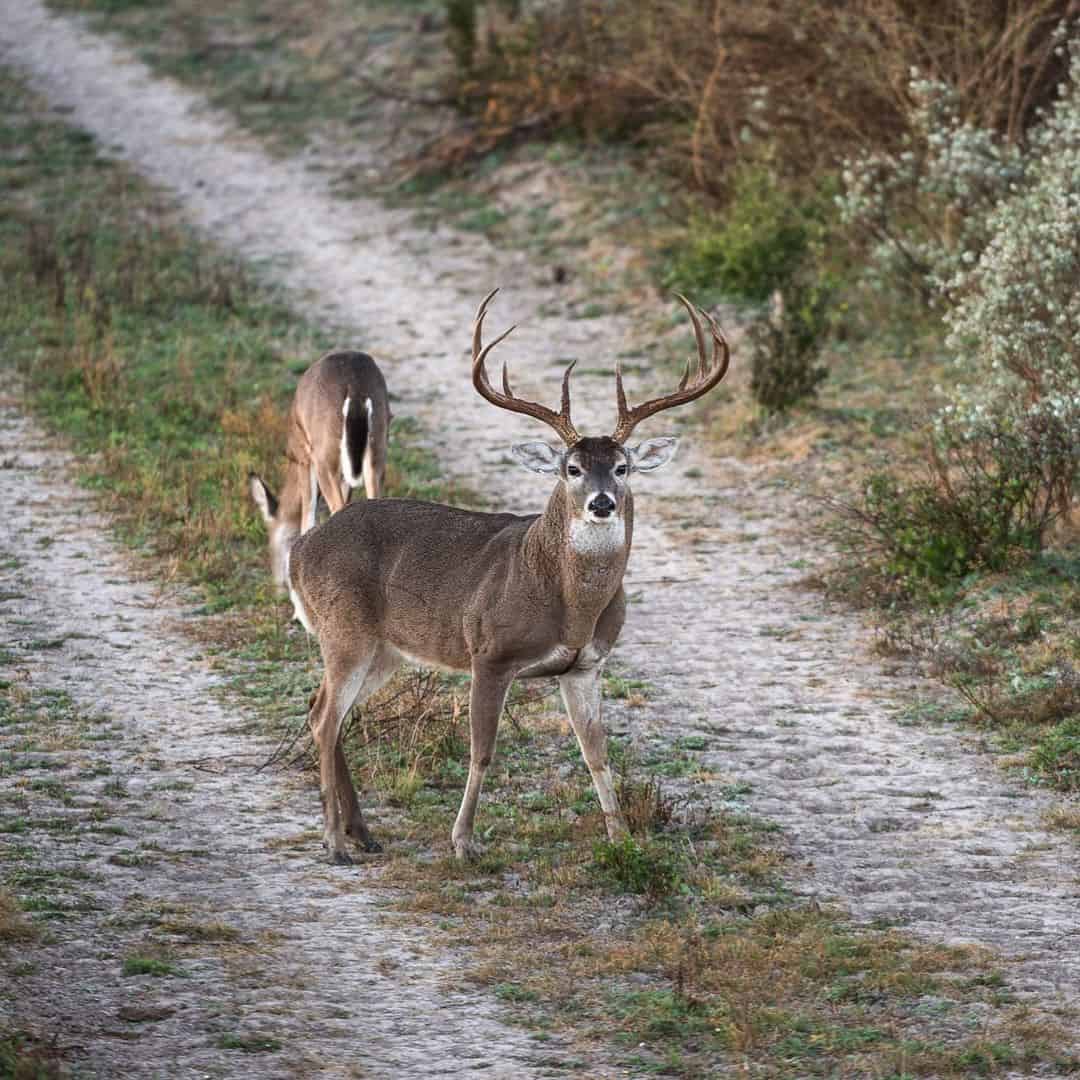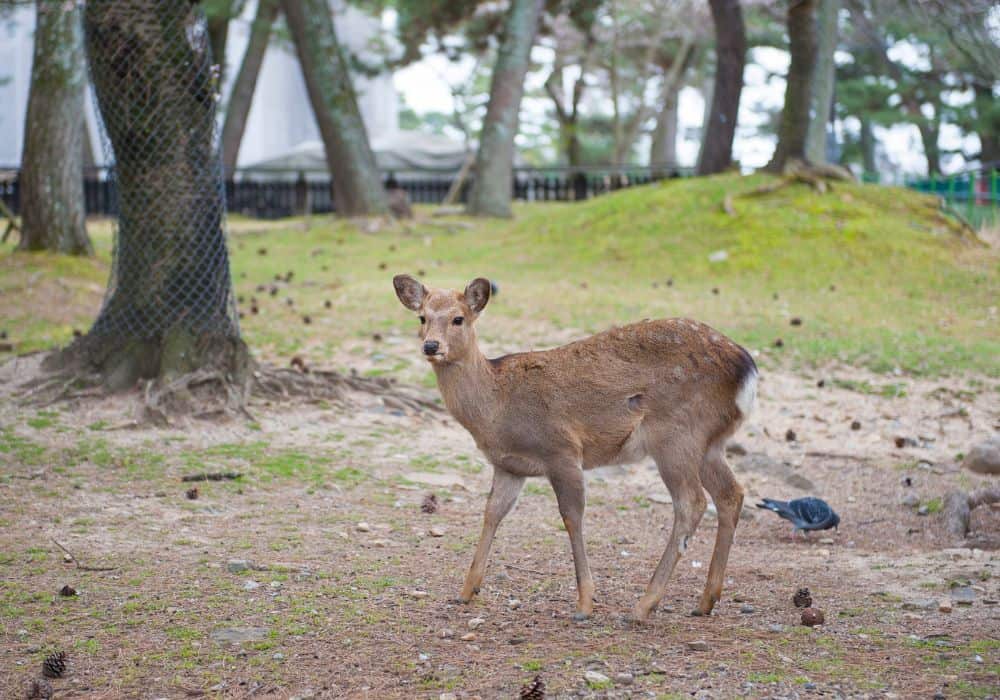Having a garden in your backyard comes with the responsibility of keeping your vegetables safe from animals who forage for food. One such animal is the deer. These woodland animals are known to often find their way into gardens and cause damage to plants, vegetables, and fruits. Fortunately, there are easy ways to repel deer.
Since deers have a powerful sense of smell that comes in handy when foraging for food, they can also be put off by smells they dislike. For instance, a deer will stay away from pungent and spicy smells such as garlic, egg, mint, sage, thyme, and even predator urine.
In this article, we’ll answer the question, what smell do deers hate by looking into common smells that deers hate. In addition to this, we’ll provide a guide on how to make homemade DIY repellents that can keep deer away.
Why Do Deers Hate Certain Smells?
Deers have a high sensitivity to smell, often considered superior to that of humans. The reason for this is the impressive amount of smell receptors that help them detect the slightest difference between smells. This evolved sense of smell comes in handy, particularly when searching for food or detecting predators.
Deers however hate a number of smells characterized by strong odors because these odors tend to cloud their sense of smell and make it challenging to detect predators lurking around. As a result of this, whenever deers detect any repelling smell in their search for food, they would rather leave the environment and continue their hunt elsewhere for fear of being attacked.
Eight Common Smells Deers Hate
Deers are put off by a variety of smells ranging from foul-smelling odors to overly-scented aromas. Let’s discuss some of them below:
1. Putrescent Egg Solids
This is undoubtedly one smell that deers hate. For this reason, it is among the most effective and easy-to-make repellents you can get your hands on. It comes off as a very putrid smell, similar to sulfur combined with a rotting egg. Typically, putrescent egg solids repellent is a mixture of raw eggs and water that have been left out in the sun for a while. Imagine the stink.
To make this repellent at home:
- Mix one or two eggs in a bowl, including the shells
- Add about 4 liters of water into the bowl and stir. This should give you enough quantity
- You can add a cup of milk to the mixture to make it rot faster and produce a more pungent smell.
- Place the mixture under the sun for a whole day
- After that, pour it into a spray can or store it in a closed container
- Apply the repellent to your plants by spraying or using a brush. Ensure you do this every few days to keep deer away.
2. Mint
Mints have a natural smell that deers find repelling and have been proven effective regardless of how you use them. You can decide to plant them in your garden, and they should be close to those crops deers are more likely to feed on or around the perimeter of your garden space.
The recommended mint species to plant are peppermint or spearmint as these species produce very potent scents that are sure to deter deer from coming near your garden.
Another option is to make mint sprays and apply them on plants and corners, as well as on the entire perimeter of your garden. Many suggest that mint sprays are a more effective Deer repellent than mint plants simply because the aromatic scent can get to every corner of your garden when sprayed.
To make this repellent at home:
- Boil 2 cups of dried crushed or freshly chopped mint leaves in 4 liters of water. This will give you enough quantity.
- You can decide to add half a cup of lavender for a more potent smell
- Once boiled, allow the mixture to cool down for a few hours
- Once cool, strain the mixture to remove the leaves, then pour the liquid into a spray can
- Apply the repellent spray around your garden every few days to keep the deer away.
3. Garlic
Popularly known for its overpowering smell, garlic is one natural spice effective in repelling deer. It’s also a common active ingredient in most commercial deer repellents. In addition to this, as a plant, garlic still does an excellent job of keeping deer away. Therefore, planting garlic alongside other plants is a giant step in keeping your vegetables safe from deer damage.
To ensure these animals stay away from your garden, you can further enhance the smell of your garlic plant by trimming its top leaves to release more of its scent.
Alternatively, you can create garlic spray repellents using garlic powder. All you need to do is mix a quarter cup of garlic powder in 2 liters of water and apply it around your vegetable garden. Once you’ve done this, sit back and watch as deers avoid your garden like a plague.
4. Sage
Sage is a herb that produces a strong smell that deers detest. With this deer-deterrent plant scattered around your yard, you can rest assured that deers have no business coming close.
We recommend that when planting sage in your garden, ensure you do so near areas where deer are likely to slip in so that the smell can drive them away before they can sneak in.
Another great way to use sage as a deer repellent is in its essential oil form, and although these are available for purchase in stores, you may decide to make yours at home. First, chop your sage leaves into a jar and heat your base oil. Next, Pour the heated oil into the jar and cover. Finally, store the mixture in a dark and moist place for about two to four weeks before using.
To use sage essential oil as a deer repellent spray, add some drops in warm water and spray all over your garden.
5. Thyme

Image Credit: deersolution
Although popularly used as a spice, thyme is a decent deer repellent, as these animals do not favor its aromatic smell. In addition, when you plant thyme among your garden crops, its smell tends to mask those of plants desired by deers, thereby preventing them from feeding on your plants.
Not only is planting thyme effective it’s also a cheap and sustainable method, as it doesn’t require much to grow.
Another interesting fact about thyme is that, much like sage, you can concentrate it in base oil and apply it on fences and other areas around your garden. However, for more effect, we advise you to spray the oil on plants targeted by deer and in places where they can gain access to your garden or yard.
6. Lavender
Lavender is known for its powerful scent. Although pleasing to the human nose, many animals, including deer, find the lavender smell very potent and repulsive. In fact, the smell of lavender easily overpowers those of other plants and saturates your entire garden, giving your environment a sweet scent while keeping deer away.
For this reason, we highly recommend planting lavender in your garden. Also, for better results, you should plant lavender around the perimeter of your yard or garden to produce a surrounding fragrance that reaches every corner.
You’ll be interested to know that just like other herbs discussed above, you can make a spray using lavender essential oil. All you’ll need is warm water, lavender essential oil, and a spray bottle. First, pour your warm water into the spray bottle, then add 12-18 drops of lavender oil. Once this is done, shake the mixture and spray it in specific areas of your garden as a deer deterrent.
7. Predator Urine

Image Credit: lascuevasranch
Predators such as wolves and foxes are known to pee constantly in areas they inhabit as a sign of marking their territory. Fortunately, deers know this and, thanks to their heightened sense of smell, can detect the presence of these animals by their urine.
Also, because deers are below the food chain and are often prey to wolves and foxes, they’ll stay away from places that have their urine stench.
Once a deer catches a whiff of a predator’s urine, it immediately goes into flight, which is its primary defense mechanism. Therefore, spraying wolf or fox urine in the corners of your garden will definitely keep the skittish animal away.
You can purchase high-quality wolf urine in designated online and offline stores. However, before purchase, ensure you check local laws and guidelines regarding using predator urine as a repellent.
8. Oregano
Aside from being a popular cooking herb, oregano is known for its deer-repellent smell. Planting oregano along with other plants in your garden or areas surrounding your yard is a sure way to mask the smell of other desirable plants from the sensitive nose of deer.
Also, if you’d rather use essential oils, oregano has you covered. You can make your oregano essential oil by soaking oregano leaves in essential oil and storing them in a dark place, preferably in a kitchen cabinet, for 2-4 weeks before using.
When applying your oregano oil, target elevated surfaces like fences, rocks, and the top parts of plants. Also, you can apply in low areas to increase the potency of the smell. Again, as with other herbs, you could go for oregano sprays using warm water and a few drops of oregano oil in a spray can.
Ensure you apply your oregano spray to every corner of your garden and around plants targeted by deer.
Final Thoughts
Although deers are lovely creatures with an aesthetically pleasing appearance, they’re not void of menace as they habitually damage crops. Fortunately, we’ve provided useful information on smells these animals hate and how to use them as repellents.
Also, Asides the smells listed above, you’ll be interested in knowing that shrubs and ferns like poppies, daffodils, and boxwood are excellent deer-resistant plants due to their natural smell and bitter taste.
By learning how to effectively use smell to control deer infestation, you can better preserve your garden and produce crops that have not been tampered with by animals and are thus safe for consumption.
